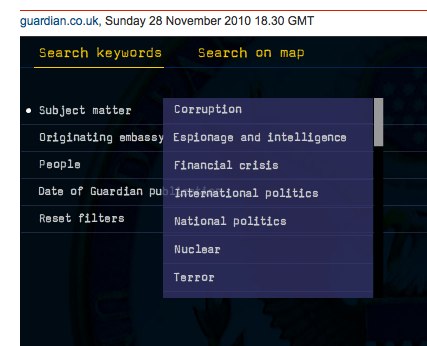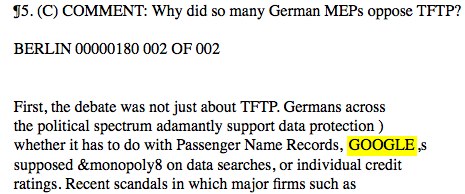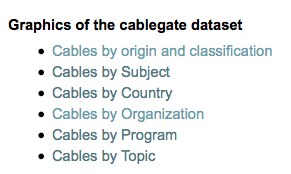Searching The Wikileaks Cablegate Archives With Cablesearch
Want to explore the “Cablegate” material that Wikileaks released last week for yourself, but have no idea where to start? There’s a new search engine for the material. Cablesearch: A Google For Cablegate Called Cablesearch, it’s a project from the Eccar: The European Center of Computer Assisted Reporting. Gary Price from ResourceShelf tipped us to […]
![]() Want to explore the “Cablegate” material that Wikileaks released last week for yourself, but have no idea where to start? There’s a new search engine for the material.
Want to explore the “Cablegate” material that Wikileaks released last week for yourself, but have no idea where to start? There’s a new search engine for the material.
Cablesearch: A Google For Cablegate
Called Cablesearch, it’s a project from the Eccar: The European Center of Computer Assisted Reporting. Gary Price from ResourceShelf tipped us to the new resource today, and he also writes it up here.
I played around with the service a little, trying to search for some key terms mentioned in articles by The Guardian from the leaked cables. I found it hit and miss. This seems most likely due to the fact that Cablesearch doesn’t have all the information that’s come out.
I couldn’t find several items published over the past three days. Going further, I had more luck.
For example, The Guardian had an article about the Bank Of England’s Mervyn King talking critically about Conservative politicians. A search for “meryvn king” found that dispatch:
Another article talked about George Osbourne, the UK’s chancellor of the exchequer, being reported by some Conservative colleagues as having a “high-pitched vocal delivery.” A search for that phrase finds the dispatch and highlights the exact section where it happens:
Browsing By Topic
Interestingly, The Guardian itself claims to have a searchable index to the cables:
But in reality, you can only search for predetermined topics:
In other words, you can’t enter any term, such as “google,” and discover this as you can in Cablesearch:
Browsing By Topic
Still, the Guardian does make it easy to browse topics (as does Cablesearch), something the Wikileaks site itself promises:
That’s because those topic visualizations aren’t hosted by Wikileaks itself but rather by a third-party, which has since removed them in reaction to call from US Senator Joe Lieberman for organizations not to host the leaked content. The company writes about its move here.
Can You Find Wikileaks?
Finding Wikileaks itself, at least the official Wikileaks website, is becoming more a challenge as it has found its Wikileaks.org domain blocked (technically, the domain name is being prevented from resolving to the Wikileaks IP address).
Currently, an alternative Wikileaks.ch domain operates. The site can also be reached via the IP address of 213.251.145.96.
Both Techmeme and Mediagazer have collections of stories about the Wikileaks website being down due to blocking and moving. The material, of course, is across the internet on many sites including “mirror” sites, at this point.
All this led me to wonder what happens if you try to find Wikileaks on the major US search engines. On Google, currently you get the old address that doesn’t work:
This almost certainly is NOT a reaction by Google to prevent access to Wikileaks. Instead, it’s probably just that Google’s systems haven’t caught up to the new address. I expect the current address will likely be shown within a day.
On Bing, you do get the current working domain:
I thought that was pretty on-the-ball of Bing. It also means that Yahoo leads you to the working site, as well, as Yahoo’s results come from Bing.
Bing might be beating Google because of a human tweak to insert the correct address, the type of change that Google never does. Or, it could be that Bing’s computer-based systems are simply fresher than Google, in this case. Regardless, for those seeking Wikileaks, Bing is the better experience.
For more ways to explore the Wikileaks material, see this other blog post from ResourceShelf that lists a variety of resources.
Postscript: See our continuation and update, Google, Bing & Searching For The New Wikileaks Website.
Contributing authors are invited to create content for Search Engine Land and are chosen for their expertise and contribution to the search community. Our contributors work under the oversight of the editorial staff and contributions are checked for quality and relevance to our readers. The opinions they express are their own.
Related stories
New on Search Engine Land







